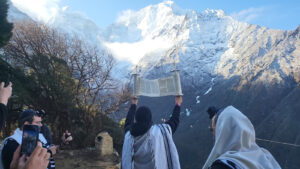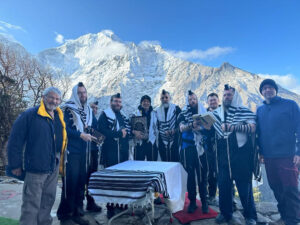
OpEds

Climbing to Everest Base Camp – a spiritual journey
Published
11 months agoon
In our community, we love going on trips. They bring excitement, they give something to look forward to, but most importantly, they boost comradeship.
However, the trips I find most beneficial are our treks.
Over the years, we have been blessed to trek in Africa, China, Peru, India, and Nepal.
Climbing a mountain is often considered a physical and mental challenge, but it can also serve as a profound spiritual journey.
On a trek, we can maximise the benefits that a communal trip brings. Sharing the challenge brings us closer, and the long walks allow for real heart-to-heart conversation. Above all, climbing mountains seems to bring our spiritual side to the forefront.
Come to think of it, it’s not surprising. Jewish patriarchs and leaders have all had spiritual treks up mountains. Avraham Avinu and his son, Yitzchak, climbed Mount Moriah; Moshe Rabbeinu went up Mount Sinai and Mount Nebo; Eliyahu performed amazing miracles on Mount Carmel; and so on.
I will share some thoughts and anecdotes from our most recent trek to Everest Base Camp, a once-in-a-lifetime adventure filled with breathtaking landscapes, physical challenges, and spiritual moments.

By divine providence, it took place just two weeks before Shavuot. Moshe received the Torah on a mountain, so preparing for Shavuot by climbing a mountain feels really special. It requires patience, persistence, and resilience, mirroring the qualities needed to be a recipient of the Torah – remaining steadfast and committed to a personal and spiritual development.
We were fortunate to have Rabbi Chezky Lifshitz, of Chabad of Kathmandu, as a guiding force, providing logistical support that made the entire trip more manageable and memorable.
Strength of the sherpas
During our trek, we encountered the remarkable sherpas, who tirelessly carried heavy loads such as iron rods and fridges, weighing up to 90kg to 100kg, supported by straps attached to their heads. In spite of the challenging nature of their work, these individuals radiated happiness and contentment. What a message in service of Hashem this was for us! If these sherpas can have such kabalas ol (acceptance the yoke of heaven) with physical things, how much more so we can have it with spiritual things, which will strengthen our connection to Hashem.
Yak’s role
We encountered numerous yaks, which play a vital role in the local ecosystem. These gentle creatures produce waste, which is then repurposed and sold as fuel. Witnessing this resourcefulness and sustainable approach to living in a remote environment was fascinating. It taught us how Hashem created this world in the most amazing way, and nothing should be taken for granted or wasted.
Spiritual encounters in the wilderness
While trekking higher into the mountains, we experienced profound spiritual moments. We had the privilege of praying Shacharit outside, accompanied by a Sefer Torah. The breathtaking scenery added a touch of awe and splendour. Capturing the essence of this extraordinary moment, one of our group members shared a picture on social media, and within minutes, it went viral, resonating with people around the world.
Jewish teachings in the mountains
The journey also allowed for unique reflections on Jewish teachings. For instance, as we encountered cows adorned with bells, we recalled studying Gemara, tractate Shabbat, which we have a weekly class on, that discusses cows carrying bells on Shabbat. The convergence of our learning and the real-life scene before us served as a powerful reminder of the relevance of the Gemara’s wisdom in our modern lives.
Another encounter brought to mind the relevance of Maimonides’ teachings in the modern era. We observed scenarios where two groups of animals – donkeys carrying heavy loads on a narrow path crossed paths with yaks carrying other heavy loads heading in the opposite direction – and the question was who would get right of way. This was fascinating to watch, as Rambam’s teachings came alive.
Importance of pace and self-control
One of the key lessons we learned was the significance of maintaining a slow pace and practicing self-control. The high altitude demanded that we adapt our walking speed to accommodate decreased oxygen levels. Even if we felt physically capable of walking faster, it was crucial to exercise self-discipline and proceed slowly.
Embracing unpredictability
One of the most striking aspects of our experience was the realisation that nothing goes precisely to plan. We learned to take each day as it came and adapt to unforeseen circumstances. For instance, if someone in our group fell ill, immediate arrangements were made, whether it was a horse to transport them or providing oxygen for another member who required assistance. Additionally, we had instances where expected food didn’t arrive, necessitating resourcefulness and improvisation. This constant need for adaptability taught us the value of flexibility and resilience in the face of challenges. It also taught us the need to have emunah (faith) and bitachon (trust) in Hashem, who is making sure everything works out well.

I often get asked what the highlight of the trek was. It’s hard to point to just one, but if I had to, the following would be it.
One night, due to the high altitude, I wasn’t able to sleep well. It was just after midnight, I had barely slept for three hours, and my body refused to go back to sleep. I knew that going outside for some fresh air would be good for me, but it was so cold outside, I was procrastinating.
Eventually, I forced myself out of my warm bed, and went outside.
Once outside, I casually looked up to the sky. The sky was crystal clear, and I saw the star formations in the most magnificent way. I later heard that it was one of the rare days when the entire milky way was observable.
I thank Hashem for not being able to sleep which led to this great opportunity.
Our Everest Base Camp journey was a transformative experience that combined breathtaking natural beauty with spiritual and communal connections. As we descended from Everest Base Camp, we carried with us not only memories of the stunning landscapes but also valuable life lessons that would forever have an impact on our perspectives and approach to challenges.
Wishing you a happy Shavuot!
- Rabbi Dovid Katz is the Rabbi of West Hampstead Chabad in London, England.










